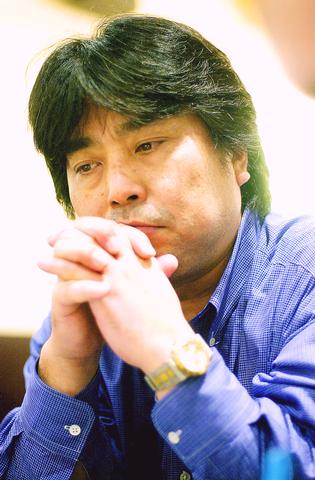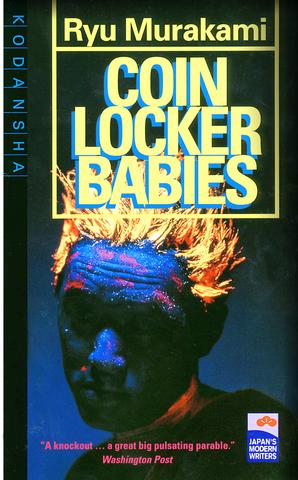The opening scene of the film Tokyo Decadence (1992) shows an S&M prostitute shooting herself up on heroin. The shot was so graphic that it caused many of a pre-release audience in Manhattan to leave the cinema. This response came as a big surprise to the film's director, Ryu Murakami, who has made a name for himself for just such a cold portrayal of Japan's seamy underbelly.
Murakami has been brought to Taipei for the International Book Exhibition by the FNAC department store, which hopes to introduce one of Japan's premier authors and filmmakers to the local public. He is slated for a final discussion with two Taiwanese novelists, Hung Chiao-nang (

PHOTO: CHEN CHENG-CHANG, TAIPEI TIMS
A measured speaker who occasionally even is a bit shy, the 48-year-old Murakami looks a far cry from Japan's most celebrated chronicler of the sex and drug subcultures, which is quite simply what he is. In the course of his career, he said he has been more or less indifferent to the kind of narrative medium he uses, having producing numerous novels and four feature films. In addition, he has also served as a television talk show host and a radio rock-and-roll DJ.

His first book, Almost Transparent Blue (1976), won Japan's Akutagawa literary prize and has sold over a million copies to date. The book, which remains a popular seller both in Japan and internationally, follows a group of Japanese teens for whom life is one constant blur of morphine, heroin, pills, booze, and shameless orgies with American GIs -- the kind of men who let fist-sized lumps of hash smolder inside incense burners just to create a little atmosphere.
"The novel was half autobiographical and half made up," said Murakami, who wrote the book from the point of view of a narrator with his own name -- Ryu. "At the time I wrote it, I was trying to purge everything that happened to me in my life up to that point. A lot of it was real, but there were also some embellishments."
Four years later in Coin Locker Babies (1980), Murakami further developed the theme of individuals completely alienated from their pasts. The book follows the life of boy who was abandoned as an infant in a train station locker.
"During the period of economic development in Japan and the time that followed, there were several cases of children who were actually left in coin lockers in train stations. I was pretty shocked by this, and I became interested in how these children could go on to live a normal life in spite of the hatred they must feel for the society that created them," he said.
Though Murakami says he doesn't think of Coin Locker Babies as a metaphor for a generation of alienated youth, he acknowledges that many young readers find relevance in the work. "That book was written 20 years ago, and each year about 30,000 to 60,000 copies are reprinted. There must be some sort of resonance there, something that people identify with."
Many of those young readers showed up yesterday afternoon to see Murakami at a panel discussion at FNAC. The crowd of about 60 was composed mostly of twenty-somethings, some of whom addressed the author directly in Japanese and most of whom seemed to know more about Murakami than the local authors who shared the podium.
"I like Murakami because his writing is so natural," said Grace Lee, age 27. "Taiwanese writers are too artificial. This whole audience is basically hoping that these ... Taiwanese writers will just shut up and let him talk."
Field, a 25-year-old hospital worker, said she was drawn to Murakami's work on account of "the feeling of freedom in that lifestyle." Yet even though she loves the spirit described in the tales of wanton abandonment, she has not been swayed by it. "No, I'd never do drugs," she said. "That kind of life isn't for me."
Murakami himself feels that his portrayal of extensive drug use -- the characters in Almost Transparent Blue trip on virtually every page -- is non-judgmental and simply a "window on reality."
At present, however, that hedonistic world is receding for Murakami. Of works like Coin Locker Babies and Almost Transparent Blue, he said, "Those were written 20 or 25 years ago. I've changed since then. Now I'm writing about the educational system in Japan and about society." His next book, due to come out next year, will deal with family issues, he added.
Though Murakami realizes some may view his new focus as an about face, but his quiet insistence as to their importance revealed the same kind of intensity he had shown in earlier works. His demeanor seemed to suggest that becoming more venerable does not necessarily mean he is becoming less edgy.
Still, one can see that he may be ready for something else. Twenty-five years ago in Almost Transparent Blue, the narrator, Ryu, extemporized, "I keep thinking, won't somebody make a movie like what's inside my head, I'm always thinking that." By now, Ryu Murakami has already fulfilled that dream several times over.
What: Panel discussion featuring Ryu Murakami, Hung Chiao-nang (紅膠囊) and Chang Huei-ching (張惠菁)
Where: FNAC coffee shop, 337 Nanking East Rd., Sec. 3, B1 (南京東路三段337號B1)
When: Tonight, 7-8pm

May 18 to May 24 Pastor Yang Hsu’s (楊煦) congregation was shocked upon seeing the land he chose to build his orphanage. It was surrounded by mountains on three sides, and the only way to access it was to cross a river by foot. The soil was poor due to runoff, and large rocks strewn across the plot prevented much from growing. In addition, there was no running water or electricity. But it was all Yang could afford. He and his Indigenous Atayal wife Lin Feng-ying (林鳳英) had already been caring for 24 orphans in their home, and they were in

On May 2, Chinese Nationalist Party (KMT) Chairman Eric Chu (朱立倫), at a meeting in support of Taipei city councilors at party headquarters, compared President William Lai (賴清德) to Hitler. Chu claimed that unlike any other democracy worldwide in history, no other leader was rooting out opposing parties like Lai and the Democratic Progressive Party (DPP). That his statements are wildly inaccurate was not the point. It was a rallying cry, not a history lesson. This was intentional to provoke the international diplomatic community into a response, which was promptly provided. Both the German and Israeli offices issued statements on Facebook

President William Lai (賴清德) yesterday delivered an address marking the first anniversary of his presidency. In the speech, Lai affirmed Taiwan’s global role in technology, trade and security. He announced economic and national security initiatives, and emphasized democratic values and cross-party cooperation. The following is the full text of his speech: Yesterday, outside of Beida Elementary School in New Taipei City’s Sanxia District (三峽), there was a major traffic accident that, sadly, claimed several lives and resulted in multiple injuries. The Executive Yuan immediately formed a task force, and last night I personally visited the victims in hospital. Central government agencies and the

Australia’s ABC last week published a piece on the recall campaign. The article emphasized the divisions in Taiwanese society and blamed the recall for worsening them. It quotes a supporter of the Taiwan People’s Party (TPP) as saying “I’m 43 years old, born and raised here, and I’ve never seen the country this divided in my entire life.” Apparently, as an adult, she slept through the post-election violence in 2000 and 2004 by the Chinese Nationalist Party (KMT), the veiled coup threats by the military when Chen Shui-bian (陳水扁) became president, the 2006 Red Shirt protests against him ginned up by